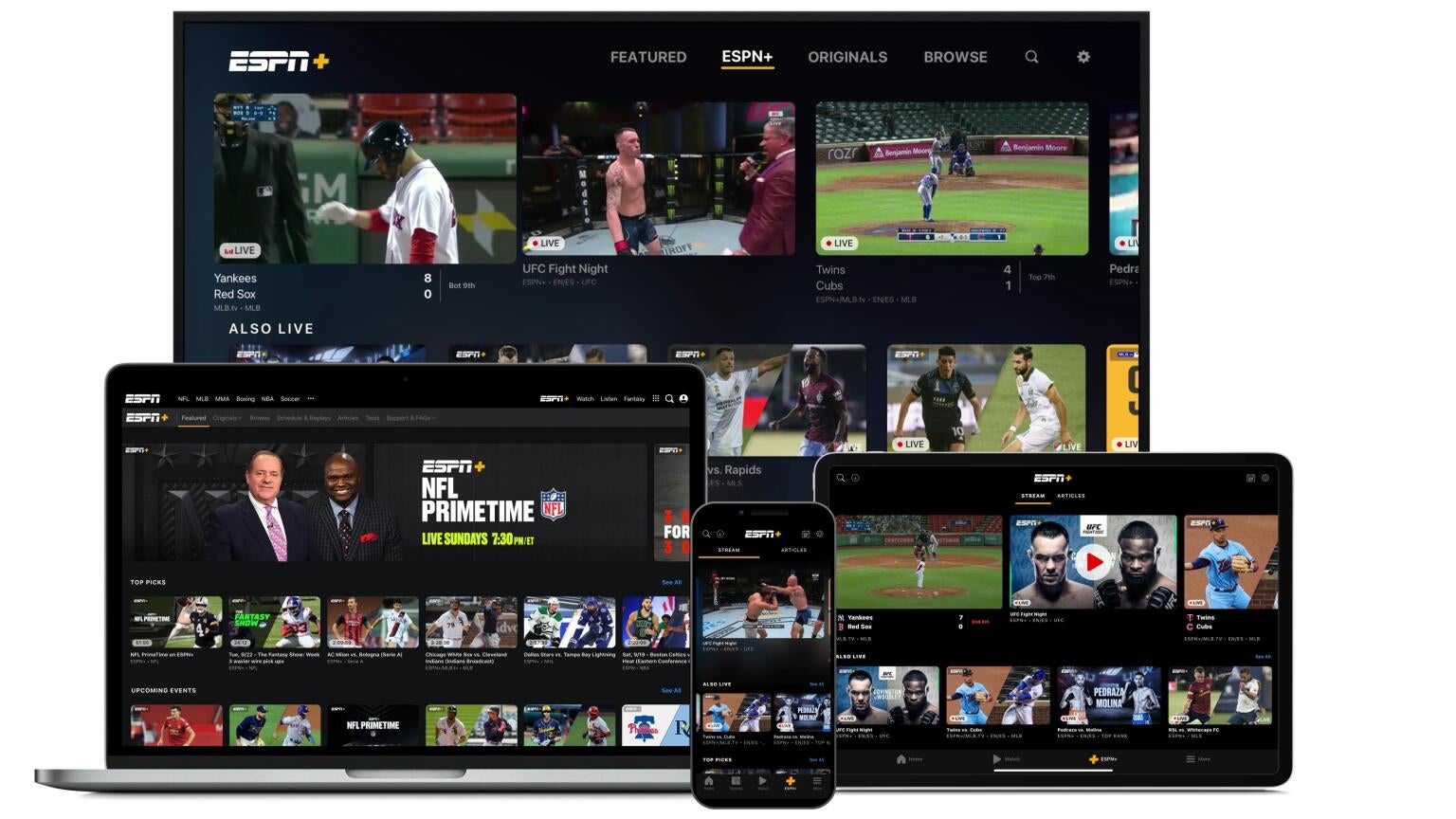Disney Has Reportedly Abandoned Plans to Spinoff ESPN; What Does This Mean for Future of Sports Streaming?

Last fall, rumors began circulating that Disney was open to the idea of spinning off ESPN into its own standalone company. At the time, Puck News’ Dylan Byers reported that Disney execs were regularly having discussions about the potential blockbuster move to either selling the sports network or make it a separate entity siloed off from the rest of the Disney entertainment apparatus.
However, according to Byers, those plans have not only been put on hold but they have been completely abandoned for the foreseeable future as well. The revelation comes as the most powerful executives in tech and entertainment are meeting at the Allen & Company conference in Sun Valley, Idaho.
“I’m told reliably by an executive here in Sun Valley that Chapek has now abandoned the effort to spin off ESPN,” Byers reports. “This sudden turnaround almost certainly reflects a recognition that live sports, the linchpin of the entire linear ecosystem, will be even more significant to Disney’s bottom line in a world where the streaming landscape is uncertain.”
In May, somewhat surprisingly, Disney CEO Bob Chapek commented that the company was looking to launch a fully-featured ESPN streaming service that would not only include the exclusive content found on current subscription streamer ESPN+, but also all of the programming found on the network’s myriad linear channels. At the time, the exec said that the service would be “the ultimate fan offering,” finally uniting all of Disney’s live sports rights, commentary, and studio shows under a single streaming umbrella.
If the company’s research turned the idea of spinning off ESPN into making it a standalone streaming service, that would make a modicum of sense given the increasing migration towards streaming and the sports-networks’ unique place in the content world. Given ESPN’s prestige positioning in sports broadcasting and its expansive cadre of live sports rights, it should be no surprise that the network is poised to be a long-term revenue generator for Disney as the entertainment environment evolves.
Live sports rights are by far the most valuable asset for most media companies, whether they be traditional broadcast networks, cable channels, or streaming services. Live, exclusive content that appeals to millions of fans deeply invested in the product has become a cornerstone to the programming plans for entertainment companies as the television landscape becomes increasingly crowded and diversified. The lure of live sports even led Netflix to get involved in bidding on live rights for the first time, before ultimately losing out to ESPN for the next round of Formula 1 racing rights.
However, with streaming services — especially Netflix — hitting a bit of a rough patch lately in terms of subscriber acquisition and stock price, it makes sense for Disney to pump the breaks on spinning off one of its most valuable assets, especially one that — as of now — has value in both streaming and broadcast.
The House of Mouse has quickly become a major force in the world of streaming, sitting just 20 million subscribers behind Netflix when combining Hulu, Disney+, and ESPN+ totals — not accounting for overlap. And on the sports side of the equation, the ESPN streamer added 1 million customers last quarter, representing a 62% increase year-over-year. So even though broadcast fees are practically increasing exponentially, it appears that Disney has decided that ESPN’s established linear and streaming hybrid still has value for the company’s greater bottom line.
Whether or not Disney decides to keep the dual approach or opts to eventually offer a completely streaming ESPN option in the future is yet to be seen. But, the company has shown signs recently of being willing to abandon streaming in favor of traditional broadcast opportunities.
In June, Disney decided to spend a reported $3 billion annually on the broadcast TV rights to the hugely popular Indian Premier Cricket league, despite having previously inherited the streaming rights to the league in the company’s acquisition of Fox. That deal expires at the end of this year, and was seen as monumentally important for Disney+ hitting its stated subscriber goals.
Despite being an enormous boon for Disney+'s subscriber numbers, because of the incredibly low cost per streaming customer in India, Disney apparently opted for the more reliable revenue via broadcast than the sustained subscriber growth on streaming.
However, with streaming services getting increasingly involved in bidding on domestic sports, Byers notes that both leagues and broadcasters are becoming concerned that by spreading rights across an ever-growing number of outlets, younger fans — who are less likely to be tied to a traditional TV bundle — are becoming especially disadvantaged, and therefore might choose to essentially opt-out of following their favorite teams and leagues in the future.
Whether it is due to price or complexity, stakeholders are concerned that by forcing consumers to find or subscribe to multiple outlets to watch a single team or league’s games, they might be inadvertently raising the barrier for entry higher than what the public is willing to hurdle.
Therefore, the future could see media companies purchasing ownership pieces of leagues in order to consolidate media rights into a single, fan-friendly experience — either in a unified app, a hub for all of the rights holders’ content, or something else altogether. The future of sports broadcasting could look similar to Apple's recent deal to stream every Major League Soccer game for an entire decade, primarily via a league-specific streamer.
With Apple considered a frontrunner to land the NFL Sunday Ticket rights following the upcoming season, we speculated last month that the tech giant’s MLS plans could be a blueprint for how it might look to innovate with NFL coverage, should they secure the incredibly valuable out-of-market package.
An additional wrinkle in the Apple/MLS deal is that it is not necessarily exclusive as the league is still able to negotiate with traditional broadcast partners for linear rights; including current partner ESPN. However, those rights would be additive; almost serving as “free” samples to entice fans to come over to the all-inclusive option on streaming.
While the NFL’s media packages provide profits for the league and serve as the single largest ratings-grabbers for broadcasters, consolidating the rights into a single service would likely take money off the table — how much is up for debate. However, by making it easy and convenient to find and watch games in an otherwise cluttered landscape, the experiment could help sustain long-term growth from generations of fans that are increasingly cutting the cord.
This notion is probably even more important for leagues with less cultural relevancy than the NFL. What a league could lose in casual viewership by moving off of traditional channels, it would ideally counter with increased stability and familiarity with fans via a single platform to watch games.
ESPN is known as the worldwide leader in sports for a reason. They have broadcast rights deals with every major domestic sports league, broadcast dozens of college sports throughout the year, and are increasingly investing in women’s, amateur, and niche sports to fill out their offerings. If the network ever decides to spin its channels off into a streaming service, it would immediately become a must-have platform for practically every sports fan; making an invaluable asset to Disney.
ESPN’s chairman Jimmy Pitaro told The Athletic's Richard Deitsch in late-June, “The reason you don’t have a date on [a direct-to-consumer ESPN streaming service] is because we don’t have one. It’s that simple … I would say, ‘I can’t talk about that,’ if I couldn’t talk about it … but we don’t have a date.”
So, if we take Pitaro at his word, nothing is imminent for a unified ESPN streamer, but given Byers’ reporting, if — and when — it eventually happens, it will apparently be under the Disney umbrella.
ESPN+
ESPN+ is a live TV streaming service that gives access to thousands of live sporting events, original shows like Peyton’s Place, the entire library of 30 for 30, E:60, The Last Dance, as well exclusive written analysis from top ESPN insiders. Sports available on ESPN+ include NFL, MLB, NHL, UFC, College Football, F1, Bundesliga, PGA Tour, La Liga, and more.

